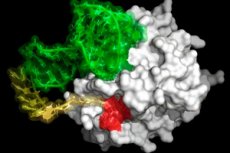New molecule imitates the anticoagulant effect of blood-sucking organisms
最近審查:14.06.2024

Nature has given ticks, mosquitoes and leeches a quick way to prevent blood clotting so they can extract their food from their host. Now the key to this method has been used by a team of researchers from Duke University as a potential anticoagulant that could be used as an alternative to heparin during angioplasty, dialysis, surgery and other procedures.
In a paper published in the journal Nature Communications, researchers describe a synthetic molecule that mimics the effects of compounds in the saliva of blood-sucking creatures. Importantly, the new molecule can also be quickly neutralized, allowing clotting to resume if necessary after treatment.
“Biology and evolution have developed highly effective anticoagulation strategies several times over,” said senior author Bruce Sullenger, Ph.D., professor in the departments of surgery, cell biology, neurosurgery, and pharmacology and cancer biology at Duke University School of Medicine. “This is the ideal model.”
Sullenger and his colleagues at Duke University and the University of Pennsylvania, including lead author Haixiang Yu, Ph.D., a member of Sullenger's laboratory, began with the observation that all blood-sucking organisms have evolved a similar system for inhibiting blood clotting. The anticoagulant in their saliva uses a two-phase process: it binds to the surface of certain clotting proteins in the host's blood and penetrates into the core of the protein to temporarily inactivate clotting during feeding.Blood-sucking organisms target different proteins among the more than two dozen molecules involved in coagulation, but the research team focused on developing molecules that target thrombin and factor Xa in human blood, achieving biphasic anticoagulation function against these proteins.
The next challenge was to develop a way to reverse the process, which is necessary for clinical use to ensure that people do not bleed. By fully understanding the activation mechanism, the researchers were able to create an antidote that quickly restores coagulation.
“We believe this approach may be safer for patients and cause less inflammation,” Yu said.
Another advantage is that it is a synthetic molecule, unlike the current clinical standard for the last 100 years, heparin. Heparin is derived from pig intestines, which requires a huge farming infrastructure that generates pollution and greenhouse gases.
“This is part of my new passion—improving blood clotting controls to help patients while also taking climate considerations into account,” Sullenger said. “The medical community is starting to recognize that there is a big problem here and we need to find alternatives to using animals to make medicine.”

